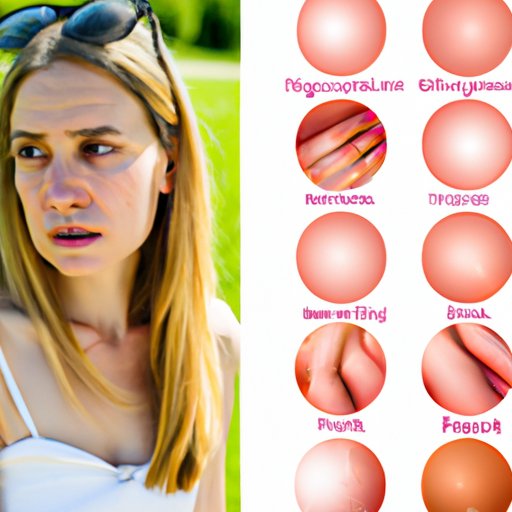Introduction
Skin discoloration is a common issue that can affect anyone regardless of age or gender. It is characterized by patches of skin that are either lighter or darker than the surrounding area. While most people associate skin discoloration with sun damage, there are actually many other possible causes including medications, health conditions, genetics, stress, and hormonal imbalances.
Causes of Skin Discoloration from Sun Exposure
Sun exposure is one of the most common causes of skin discoloration, especially in those with fairer skin tones. Ultraviolet (UV) rays from the sun can cause the production of melanin, which is the pigment responsible for skin color. Too much exposure to UV rays can result in an excess production of melanin, leading to dark spots on the skin known as hyperpigmentation.
The effects of sun damage can range from mild to severe. Some common signs and symptoms include redness, itching, peeling, dryness, and flaking. In more severe cases, skin discoloration can occur, resulting in uneven skin tone and texture.

Medications and Health Conditions That Lead to Uneven Skin Tone
Certain medications can also lead to skin discoloration. For example, antibiotics such as tetracycline and doxycycline can cause areas of the skin to become darker or lighter than normal. Other medications such as non-steroidal anti-inflammatory drugs (NSAIDs) and antifungals may also contribute to skin discoloration.
Health conditions such as vitiligo and melasma can also cause skin discoloration. Vitiligo is an autoimmune disorder characterized by white patches of skin due to a lack of melanin. Melasma is a condition that results in dark patches on the skin due to an overproduction of melanin.
Genetics and Skin Discoloration
Research suggests that genetics may play a role in skin discoloration. Certain genes may be linked to skin pigmentation disorders such as albinism and vitiligo. Albinism is a genetic disorder characterized by a lack of melanin, while vitiligo is an autoimmune disorder that results in white patches of skin due to a lack of melanin.
Genes may also influence how sensitive the skin is to the sun, which can lead to an increased risk of sun damage and skin discoloration. Additionally, some people may be more prone to developing certain conditions such as melasma or eczema, both of which can cause skin discoloration.

Stress and Skin Pigmentation Changes
Stress can also have an effect on skin pigmentation. When a person is under chronic stress, their body produces cortisol, a hormone that can cause inflammation and an increase in melanin production. This can lead to dark spots on the skin known as hyperpigmentation.
To avoid skin discoloration from stress, it is important to find ways to reduce stress levels. Techniques such as yoga, meditation, and deep breathing can help to reduce stress and maintain healthy skin.

Hormonal Imbalances and Skin Color
Hormonal imbalances can also lead to skin discoloration. During pregnancy, women may experience changes in their skin color due to increased levels of hormones. Birth control pills and menopause can also cause changes in skin pigmentation.
Treatment for hormone imbalance-related skin discoloration may include topical creams, laser treatments, and chemical peels. It is important to consult with a doctor before starting any type of treatment.
Conclusion
Skin discoloration is a common issue that can be caused by a variety of factors, such as sun exposure, medications, genetics, stress, and hormonal imbalances. To maintain healthy, even-toned skin, it is important to protect the skin from the sun, avoid certain medications if possible, reduce stress levels, and seek treatment for any underlying health conditions or hormonal imbalances.


